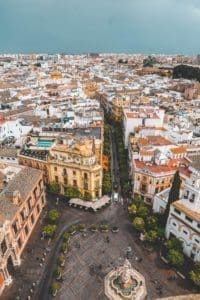The Jewish History of Spain – Issuance of a Portuguese Passport for Sephardic Jews
Spain has a rich and fascinating Jewish history. It is the first country where the members of the Jewish diaspora had political and social success in all fields of life, including with regards to their religion. For a period, Jews were involved almost totally in Spanish social life, without fear or religious restriction.
Our law offices have extensive experience in the field of immigration. Our offices provide assistance with filing applications to many Israelis and Jews around the world, that are interested in issuing a Portuguese passport for Sephardic Jews. We are in contact with the Jweish communities in Porto and Lisbon, who are in charge of giving a final approval for the applicant’s European passport applications.
The Jewish History of Spain – from the Days of Babel Exile
 There are traditions that indicate that Jews came to Spain after the destruction of the first Holy Temple in 586 BCE. They arrived by ship, or on foot via Morocco. According to archeological and historical findings, we know that Jews settled in Spain shortly before the birth of Jesus. This is because one of the first Christian apostles, known as Paul, has mentioned in his epistles to the Christian community in Greece, that he plans to reach Spain in order to convert more Jews to Christianity. Rabbi Isaac Abarbanel stated that the name of the city Toledo (in Arabic: Tulitula) derives from the hebrew verb taltala (“a collapse”). It is a hint for the Jews who came after the destruction of the first Temple.
There are traditions that indicate that Jews came to Spain after the destruction of the first Holy Temple in 586 BCE. They arrived by ship, or on foot via Morocco. According to archeological and historical findings, we know that Jews settled in Spain shortly before the birth of Jesus. This is because one of the first Christian apostles, known as Paul, has mentioned in his epistles to the Christian community in Greece, that he plans to reach Spain in order to convert more Jews to Christianity. Rabbi Isaac Abarbanel stated that the name of the city Toledo (in Arabic: Tulitula) derives from the hebrew verb taltala (“a collapse”). It is a hint for the Jews who came after the destruction of the first Temple.
In 1783, an ancient tombstone was found in the city of Adra, in the south of Spain. The writing on the tombstone mentions the name of an infant (most of the name has been erased): “The daughter of Solomon, died at the age of a year and 4 months, a Jew.” The tombstone is from the second century CE, and it helped researchers and historians to discover when and where the Sephardic Jews settled in the country, prior to the Christian age.
During the period of their settlements, Jews lived under different dynasties and kingdoms. At first, they lived under the Greeks, then under the Phoenicians. For 600 years, between the year 220 BCE and until 409 CE, they lived under the Romans. After them came the German Vandals and Swabians, the Iranian Alans, and then the German Visigoths came into power. From 475 until 711 the Sephardic Jews were governed by the Visigoths.
At first the Visigoths were Aryan Christians (an ancient Christian stream that denied the Catholic Holy Trinity). Apart from prohibiting marriage between Jews and Christians, as well as close social connection between them, the Visigoths did not consider the Jews as a risk or danger. However, in the year 589, they adopted Catholic Chrisitanity and their attitude toward Jews became extreme.
In the year 711, the Muslim forces have crossed the Strait of Gibraltar and won several victories over the Visigoth armies. 5 years later, Spain was entirely conquered by Muslims, with the exception of the Basque Country. Although in most of its years, Spain was a distant and remote periphery for Jews, a glorious period started from the beginning of the Muslim occupation, under the enlightened and tolerant Islamic regime, known as “the Golden Age”.
The Golden Age of the Spanish Jewry
The Golden Age is a term retroactively coined by the Haskalah movement in 19th century Europe. Unlike previous successful Jewish glorious periods in the Babylonian countries, the land of Israel, Tunisia, France or even modern Europe, the Jews of Spain prospered in both the Jewish spiritual life and the local spiritual life. In the beginning there were Jewish ministers of military and kings’ apprentice, such as Samuel Ibn Naghrillah, Joseph Ibn Naghrillah & Hasdai Ibn Shaprut, who were part of the Muslim elite in Spain. But after them, there were Jewish poets, philosophers, scholars, astronomers, mathematicians, torah commentators, kabbalists, professionals, translators, doctors, etc.
During the golden age, Spanish rabbis used to sit and study astronomy together with the top Muslims astronomers. In Great Toledo, a school of translation was established, where many Jews were hired by the authorities as translators from Hebrew and Arabic to Latin.
The Torah and Chazal Commentaries
The Kabbalah Jewish school of thought was developed together with the sefirot, about 900 years ago, by Rabbi Isaac the Blind and his students, Rabbi Ezra & Rabbi Azriel from Girona, who were the predecessors of the Ramban (Nachmanides). The version of the Jewish prayer book (Sidur), which is accepted nowadays by all the Jewish ethnic groups, was first published in Barcelona, after the city’s community asked Rabbi Amram Gaon to send a correct and unified version of prayer. The foundational Zohar book was published by the great Kabbalah figure Rabbi Moses de León.
The three great Hebrew law (halacha) decisiors (poskim) lived in Spain – Rabbi Isaac Alfasi was the head of the Lucena Yeshiva; Rabbi Asher Ben Yechiel was the head of the Toledo Yeshiva; and Rabbi Moshe Ben Maimon (Maimonides), who is considered the most important Rabbi in the past 1000 years. Ben Maimon served as Rais al-Yahud in Egypt, as the private doctor of the Egyptian governor and then as the private doctor of King Al-Afdal, son of Saladin. Maran Rabbi Joseph Karo, the author of the book of halacha “Shulchan Aruch”, based his writings on the decisions of the three aforementioned decisiors. Shulchan Aruch is used as a foundational book for all the decisiors (poskim) until present times.
 Geographers of the middle ages marked Lucena, Granada and Tarragona as Jewish cities. In the cities of Zaragoza, Calatayud, Zamora, Seville, Toledo, Granada, Lucena, Barcelona and Córdoba, there have been important Yeshiva institutions, where the most important religious figures have led the Jewry of Spain and abroad. Among them were Rabbi Shlomo ibn Aderet, Rabbi Yonah from Girona, the Ramban, Rabbi Yom Tov Asevilli, Rabbi Nissim from Girona, Rabbi Isaac ben Sheshet, Rabbi Aharon HaLevi, Rabbi Maimon ben Joseph, Rabbi Joseph ibn Migash and other great and known Rabbis.
Geographers of the middle ages marked Lucena, Granada and Tarragona as Jewish cities. In the cities of Zaragoza, Calatayud, Zamora, Seville, Toledo, Granada, Lucena, Barcelona and Córdoba, there have been important Yeshiva institutions, where the most important religious figures have led the Jewry of Spain and abroad. Among them were Rabbi Shlomo ibn Aderet, Rabbi Yonah from Girona, the Ramban, Rabbi Yom Tov Asevilli, Rabbi Nissim from Girona, Rabbi Isaac ben Sheshet, Rabbi Aharon HaLevi, Rabbi Maimon ben Joseph, Rabbi Joseph ibn Migash and other great and known Rabbis.
In the field of poetry, Spanish-Jewish poets who became known are Rabbi Juddah Halevi, Shlomo ibn Gabirol, Moshe ibn Ezra, Abraham ibn Ezra, Yehuda Alharizi, Todros Abulafia, Joseph ibn Abitur, Abun, etc.
Scholars and Commentaries of the Spanish Jewry
Sephardic famous philosophers were the Rambam, Rabbi Hasdai Crescas, Rabbi Joseph ben Judah ibn Aknin, Shem-Tov ibn Flaquera, Rabbi Juddah Halevi, Zarchia Chen, Joseph Albo, Isaac Albalag, Isaac Orobio de Castro and many others.
Known Sephardic commentaries: Isaac Abarbanel, the Ramban, Rabbi David Kimhi, Rabbi Joseph Kimhi (father of the aforementioned), Rabbi Abraham ibn Ezra, Rabbi Levi ben Gershon (Gersonides), Rabbi Moses Narbonne, Joseph Caspi, Rabbi Isaac ben Moses Arama and others. A large part of the above list consists of commentaries from the Region of Provence in southern France. The Provence Jewry in the middle ages was an independent community with a Jewish Provencal dialect, within the Roman-Latin family of dialects. This community was influential and unique in its Rabbis, who were significantly influenced by the Spanish Jewry. They even used the phrase “ibn” (like the Spanish Jewry) in order to describe their dynasty. For instance, Rabbi Juddah ibn Tibbon, Rabbi Joseph ibn Caspi, and so on.
Senior Sephardic astronomers and mathematicians: Rabbi Judah ibn Verga, Abraham bar Hiyya, Abraham Zacuto, Abraham ibn Daud, Isaac Israeli ben Joseph, Isaac ibn al-Ahdab, Jacob ben Machir ibn Tibbon.
The Christian Conquest of Spain (Reconquista)
Over the years the Christian kingdoms of northern Spain continued to fight Muslims. At first it was the French, then guerrilla forces of Spanish kingdoms like Aragon, Castile, Navarre and others (who were founded as a result of the wars with the Muslims) also took part. For 700 years the Christian kingdoms have pushed the Muslims toward Southern Spain. As a result, more and more small Christian kingdoms were formed over the time. The kingdoms of Castile and Aragon took over these kingdoms in the 12th century. In 1479 Castile and Aragon united and created the unified Spain.
The Alhambra Decree
In January 1492, after 700 years of continuous war, the Christian forces managed to take over all the fields of the Iberian Peninsula. Due to the increasing bloodshed and extreme religious patriotism for hundreds of years, Spain became known as a dark, sadistic and cruel place.
Psychologically, the Spanish saw themselves as fragile in comparison with the Muslims, as well as the Jews. They demanded the expulsion of the Jews. Two months after the great victory over the last of the Muslims, the Spanish Royal House declared a general expulsion order for all the Spanish citizens who refused to convert to Christianity at the Alhambra Castle of Granada. The expulsion order stated that Jews and Muslims will have to Spain leave before July 31, 1492. Jewish and Muslim citizens who stayed in Spain and secretly followed their traditions after the deportation, if caught, were cruelly turtured on the breaking wheel, burned alive, were teared alive on the Spanish “donkey” (wooden horse) device or suffered other cruel punishments.
Nowadays, Jews of North Africa, Italy, Turkey, Greece, Bulgaria, Romania, Iraq, Syria etc., are called Sephardim, because they are descendants of the great Spanish Jewish diaspora, which covered those places and swallowed up the Jewish population assimilated into it. The Jews who came to the aforementioned countries were considered as a bourgeois, literate, educated and progressive population. Thus, except for a few cities that refused to accept the Sephardic authority, wherever the Sephardic communities came, they instilled their customs and the Sephardic traditions on the local Jewish citizens.
Additional Articles on Sephardic Jews and Examination of Eligibility for a Portuguese Passport:
- Who is Eligible for a Portuguese Passport?
- Non-Jews and Sephardic Citizenship
- Portuguese Citizenship for Israelis
We thank Mr. Jonathan Gavrielov for his help with the research on The Jewish history of Spain and the expelled Jews of Alhambra Decree, as well as with the assistance in writing this article.
Contact Us
Our law offices specialize in immigration law to Israel, the US, the UK, Canada and Portugal. If there are Sephardic traditions in your family, attesting Spanish or Portuguese affiliation, we can help you with clarifying your rights, based on the Portuguese Nationality Law. Check if you are also eligible for a Portuguese citizenship, like thousands of other Israelis. For examination of your eligibility, call one of the phone numbers below.
מאמרים מומלצים

